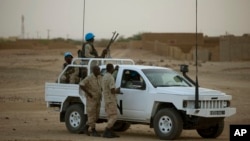The Security Council unanimously approved a resolution Friday that will enable the U.N. peacekeeping force in Mali to provide support to the new 5,000-troop African force that is charged with fighting extremists in western Africa’s vast Sahel region.
The French-drafted resolution asks Secretary-General Antonio Guterres to quickly conclude a technical agreement to have Mali’s peacekeepers provide operational and logistical support to the five-nation African force.
The support includes medical evacuation, supply of fuel, water and rations, and the use of U.N. engineering units to establish camps in Mali.
Growing menace
The so called “Group of Five” or G5 nations — Mali, Niger, Burkina Faso, Mauritania and Chad — have been grappling with a growing menace from extremists, including the Islamic State group, Boko Haram and groups linked to al-Qaida’s North Africa branch.
The G5 agreed in February to assemble a force to combat extremist groups, organized crime and human trafficking. A headquarters is now operating in Sevare, Mali, and the resolution takes note of its first operation.
The council encouraged the G5 to reach its full operational strength by its target of March 2018.
U.S. Ambassador Nikki Haley told the council the establishment of the G5 force shows “real responsiveness” to the threat from “violent extremists, often in league with transnational organized criminal networks (who) attack civilians and peacekeepers with deadly impact that is felt throughout the region and beyond.”
US support
The Trump administration has opposed putting U.N. resources into the nearly $500 million-a-year Sahel force, and the resolution makes clear that the U.N. will be reimbursed for the operational and logistical support it supplies.
The U.S. has pledged $60 million to the force, joining the European Union, France, Saudi Arabia and the countries themselves in supporting the G5, Haley said.
“We feel the council’s encouragement of a technical agreement is the full extent of any support role the U.N. should play outside of continued coordination and technical assistance on a voluntary basis,” she said.
The resolution “encourages the technical agreement to constitute a temporary measure toward full self-sufficiency” of the G5 force.
It states that the force has received commitments totaling more than 177 million euros so far and urges additional contributions.
The Security Council renewed political support to the G5. It also underlined that G5 operations need to fully comply with international humanitarian, human rights and refugee law and minimize the risk of harm to civilians.




